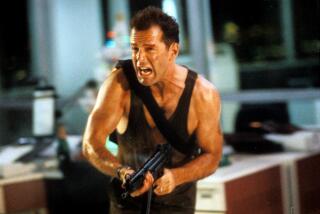Dern Near Crazy, or Is He Just a Bit on Eccentric Side?
- Share via
Bruce Dern’s wife, Andrea, came to terms with Bruce’s addiction early in their marriage. She knew he was hooked on running. The day before they got married in 1969, Dern ran a 50-mile race. Then, every Saturday, Bruce and a small group of friends rose at dawn and ran from Malibu to Marineland, 44 miles. Andrea left first, by car, and stashed soft drinks along the roadside every few miles. When they were finished, she drove the boys home.
After six months of this, one Saturday morning she didn’t get up. From the pillow, hers was the voice of reason and sanity.
“Bleep it,” Andrea told Bruce, straightforwardly, “I’m not going. I respect what you do and I’m proud of you. But this isn’t fun for me, and I think it’s sick. You guys look like POWs when you finish, and who really cares if you run 40 miles or 400 miles?
“If you want to run, take along some change for Cokes and for bus fare home. See you tonight.”
That didn’t stop Bruce, of course. He has always worked the fringes of sanity, in his running and in his acting. In Gunsmoke and other TV Westerns, he always played the wild-eyed bad guy. He specializes in portraying unstable types. He killed John Wayne, broke Karen Black’s nose, threatened Jane Fonda with a gun and bayonet, cheated on Ann-Margaret.
As a runner, he threw up before every race he ever ran in high school and college. In 1966, he got into ultra-long distance running, and once went 14 years without missing a day of serious training. He estimates that he has run more than 100,000 miles. Now at 51, Dern has cut way back, to about seven or eight miles a day, down from his old 130 miles a week, but they are seven or eight very serious miles. Nothing stops him.
“I still have trouble watching the last 10 minutes of ‘Coming Home,’ because I’m not suicidal,” says Dern, referring to the scene where his character, a Vietnam vet, wades into the surf to drown himself. “I don’t mind killing in a movie, or dying. But taking my own life . . . It’s very, very hard to watch, because I’m not a giver-upper.”
On the subject of running, Dern also says:
--”I’ve never experienced this ‘runner’s high.’ It’s grim out there, man. You run in the woods, it’s beautiful, but so many times I’ve fallen, hit rocks, stumps, trees. . . . During a run, it’s never fun.”
--”I’m not sure that the marathon hasn’t become the yuppie ultra-achievement in sports. What they do is they crash-train, they finish it, then they walk away from it. They’re not there two years later. It’s like, ‘I did a marathon, I got my master’s degree, I wrote a book . . . ‘ “
--On running along Pacific Coast Highway: “The enemy is really the surfers. It’s not that they’re not good drivers, but they’re in a hurry when they hear it’s up, man. They got their board stuck out on the curb side and they’re looking for a parking spot.”
--”I’ve got a bad lower back, no tissue between the fourth and fifth disc; a real bad right knee, just ground away. . . . My biggest fear is, if I stop, how will I substitute?”
There is also a sports-fan craziness in Dern. He probably spends half his waking life reading about, listening to, watching and betting on sports. He sees drama there. For him, the saddest days of the year are the days big league teams make their final cuts, the days dreams end.
One morning, he was eating his breakfast and reading the sports. Tears welled in his eyes. “What’s wrong?” Andrea asked.
“Joe Delamielleure got cut,” Dern said. “He was the Electric Company (O.J. Simpson’s blocking unit at Buffalo)! He made a city proud of itself! They gave that city life!”
He cried like a baby after the ’69 NBA finals when he saw Boston’s Bill Russell, walking off the court, put his arm around Jerry West, who had played a courageous series. Images. Real life drama. Dern always wanted to translate that feeling onto film, then . . .
Then this acting craziness and the running craziness and sports-fan craziness collided head-on when Dern made a movie about a crazy runner, or at least a very strange and very dedicated one.
The movie, “On the Edge,” is about a former college hotshot named Wes Holman who comes back at about 50 for one more race, a killer mountain run, to settle old scores, prove something to himself, to his father, to the Establishment and to the whole world.
The movie hasn’t done real well at the box office, despite generally good reviews. It’s hard to find a house playing it now. But it is obviously a film close to Dern’s heart.
There is a lot of real Bruce Dern in the movie. Wes Holman never seems to be on any kind of runner’s high; he appears to be mostly in runner’s pain. He falls a few times on mountain trails. Nothing stops him. He seems a little crazy, obsessed. His father doesn’t believe in him and his silly running. In real life, Dern’s parents turned their backs on him when he went into acting.
In real life, it took Dern about 20 years of running to be able to enjoy the agony of running, to find real meaning in the sport. In the movie, Wes Holman is about to win the race when he suddenly stops and waits for the other runners who came to his aid along the trail.
“He grows up,” Dern says. “He has a chance to do what he dreamed of doing, but he chooses to include his fellow runners, because nobody does it by himself. In his moment in the arena, he becomes a human being, he becomes a man.”
Fortunately, Dern has a wife who helps him keep all this running stuff in perspective. Otherwise, he could really get carried away.
More to Read
The biggest entertainment stories
Get our big stories about Hollywood, film, television, music, arts, culture and more right in your inbox as soon as they publish.
You may occasionally receive promotional content from the Los Angeles Times.










